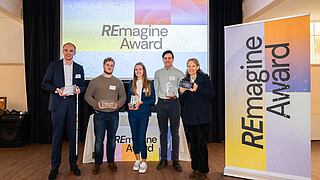Tell us about the Responsible Research in Business and Management (RRBM) network. What excites you most about joining this community, and how will your appointment contribute to RSM in the years ahead?
RRBM is a global network of senior scholars in business and management aiming to transform business and management research to better serve society. Most RRBM members are deans and former deans, AOM presidents and former presidents, or journal editors and formal journal editors.
Through the RRBM principles for responsible research, its members challenge traditional academic metrics while maintaining rigorous standards. What excites me most is the systemic approach to RRBM – it actively challenges how research quality is evaluated, how journals prioritise impact and how schools measure the career success of their faculty.
As an RRBM Fellow, I leverage RSM's work in impact assessment and sustainability education to help shape international standards while bringing global insights back to strengthen our programmes. This delivers strategic benefits such as: direct input into standards development to help shape future accreditation criteria; enhanced access to leading institutions worldwide; and reputation enhancement that is essential for attracting world-class faculty, ambitious students and forward-thinking corporate partners.
You were previously part of the RRBM Global Working Board. What does it mean to you personally to now be recognised as a RRBM Fellow?
My transition to Fellow formally recognises the contributions I have made to RRBM's mission. The Working Board's unanimous recommendation highlighted my initiative to organise the inaugural RRBM Global Summit in Rotterdam in 2019 as a legacy event, calling my role a "true cornerstone in the founding and growth of RRBM."
This carries particular weight given the fellows group is made up of just 25 distinguished members worldwide from institutions such as Georgetown University, UCLA Anderson, Wharton, INSEAD, and National University of Singapore. The autumn 2025 cohort has only added five new members globally – colleagues from University of Michigan's Ross School, Rice University's Jones Graduate School, ESCP Business School Paris, University of Strathclyde, and RSM – underscoring the appointment's value.
For RSM, this validates our commitment to responsible research principles at the highest international level, which also strengthens our position in recruiting international faculty, pursuing strategic partnerships, and enhancing our standing in impact-focused rankings.
In addition to being appointed as an RRBM Fellow, you are also involved in multiple global strategy organisations. How do these additional activities tie in with your RRBM membership, and how do they all benefit RSM, degree education and executive education as a whole?
Having me in this role benefits RSM by providing first-mover advantages in responding to Dutch science and education policy changes and strengthens our voice in the national research ecosystem. My portfolio of networked affiliations creates synergistic effects that help to amplify RSM's global influence and reputation. I am the strategic advisor to the Council of Deans in Economics and Business (Netherlands), who represent the 14 Dutch schools of economics and business. I help them to develop their joint impact agendas, like the annual DEB Impact Forum (fourth edition, 2 December 2025), the recent publication of the thematic DEB impact agenda Challenges of Transition.
In the EFMD Business School Impact System (BSIS) Steering Committee, I help to guide how business schools across Europe, Asia and the Americas measure and communicate societal impact. Through BSIS, we're developing what I term "institutional literacy for impact reporting", i.e., helping schools move from anecdotal stories to thematic strategic impact narratives. RSM's involvement ensures our methodologies influence international impact standards while keeping us ahead of evolving accreditation requirements.
Additionally, as a member of the Academic Journal Guide Management Committee of the Chartered Association of Business Schools (CABS), I help to influence research quality assessment across the UK and increasingly in global business schools to help ensure societal impact considerations are being integrated into journal rankings that guide faculty research priorities. These selective journals lists benefits our faculty in selecting the best publication venues that value impact alongside theoretical contribution, crucial for career advancement.
As the chair of the PRME SIP renewal committee in 2021-2023 for UN PRME SIP Renewal Committee, I served the redesign of the PRME progress reporting logic of how the network of 800+ schools worldwide report on sustainability and responsible management education, shifting from compliance-based reporting to strategic impact communication through the newly developed PRME Commons Platform.
As you step into this honorary role, what fresh opportunities do you hope to embrace – whether through mentoring, collaboration or inspiring the next generation?
RRBM’s fellowship structure opens strategic opportunities for RSM through voluntary engagement rather than formal duties:
International collaborations: The fellows network spans top institutions across six continents. A reach that enables multi-institutional research projects that address grand challenges, faculty exchange opportunities, and collaborative doctoral initiatives that emphasise societal impact.
Faculty management & mentoring programmes: Establishing support systems for early-career and senior career researchers that balances impact with traditional metrics, thereby creating events that bring RRBM thought leadership to RSM faculty, exemplifying responsible research practices.
Strategic influence: Greater flexibility to experiment with innovative impact assessment approaches, bridge RRBM with other international networks, and to advocate for responsible research in venues where formal representation might be constrained.
What else would you like to share about RRBM or your new appointment?
This appointment comes at a pivotal moment with converging factors – EU sustainability reporting requirements, post-pandemic questioning of business's role, and technological disruption – that have created urgency and opportunity. RSM's Fellowship representation ensures we're shaping, not just responding to, global transformation.
As a kind of ecosystem for transformation, RRBM's significance lies in transforming business knowledge and impact from a ‘transactional mindset’ focused on metrics and indicators to a ‘relational mindset’ that emphasises value creation and collective impact. You can see this in evolving accreditation standards and journals that value societal relevance.
Providing institutional legacy, my RRBM Fellowship helps me to continue RSM's decades-long commitment to responsible management research. It signals that societal impact is fundamental to our identity while providing us with a competitive advantage in shaping impact assessment standards.
About Wilfred Mijnhardt
Wilfred is the Policy Director General at RSM and an honorary professor at Edinburgh Business School, Heriot-Watt University (EBS-HWU).



